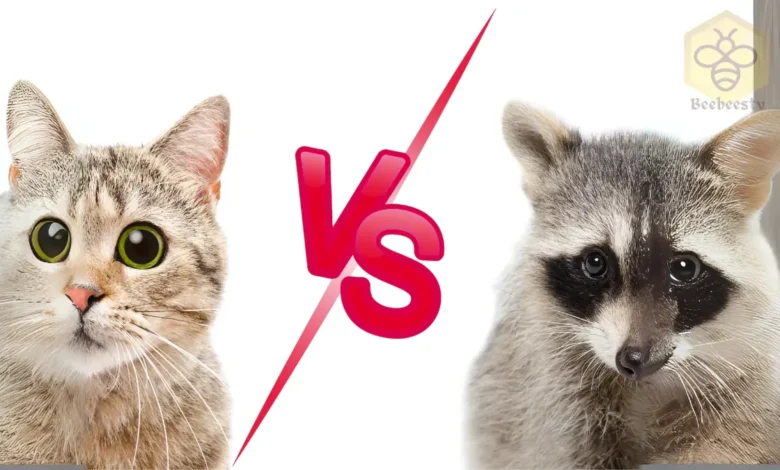Cats and Raccoons: Who Would Win in a Fight?

Cats and Raccoons: Who Would Win in a Fight?
Cats and Raccoons
Introduction
Have you ever wondered who would come out on top in a battle between cats and raccoons? It’s a strange but intriguing question! Cats are sleek, agile, and often the rulers of their domain, while raccoons are clever, tough, and known for their street-smart survival tactics. While we hope our pets never encounter a wild raccoon, it’s interesting to think about who might win if Cats and Raccoons crossed paths in a real-life brawl.
Let’s break it down: we’ll compare their physical traits, instincts, and more to see if we can figure out a potential winner. But remember, this is all hypothetical and no animals should ever be put in harm’s way!
Physical Characteristics
The outcome of any animal fight often comes down to raw physical ability. So, who has the physical upper hand between Cats and Raccoons?
Size Comparison
Generally speaking, raccoons tend to be larger than cats. An average adult raccoon weighs between 10 to 20 pounds, whereas most domestic cats range from 8 to 15 pounds. However, size doesn’t always determine the winner. In the animal kingdom, speed, agility, and fighting techniques can often offset a size difference.
Cats’ Agility and Flexibility
Cats are known for their incredible agility and flexibility. They can twist their bodies mid-air, jump great heights, and squeeze through tight spaces. This gives them an advantage when it comes to dodging attacks or launching surprise pounces.
Raccoons’ Strength and Sturdiness
Raccoons, on the other hand, are known for their strength. Their stocky bodies are sturdy and muscular, giving them the ability to hold their ground in a fight. They are surprisingly strong for their size and can use this to their advantage when defending themselves.
Natural Instincts
Both cats and raccoons are equipped with powerful instincts that drive their behavior.
Cats’ Predatory Nature
Cats, whether domestic or wild, are natural-born hunters. Their predatory instincts kick in when faced with danger, making them fierce fighters. They have sharp claws, keen eyesight, and quick reflexes—all tools that make them deadly in a confrontation.
Raccoons’ Scavenger Survival Skills
Raccoons are more scavengers than predators, but don’t let that fool you. Their survival instincts are just as sharp. They’re used to foraging for food and defending their findings from other animals. This makes them more defensive fighters, relying on clever tactics and brute strength when necessary.
Behavioral Traits
Understanding the typical behavior of cats and raccoons can offer insights into how they might handle a fight.
Cats’ Territorial Instincts
Cats are fiercely territorial creatures. If they feel their space is being invaded, they won’t hesitate to defend it. This can lead to aggressive behavior, particularly in outdoor cats who are used to defending their turf from other animals.
Raccoons’ Problem-Solving Abilities
Raccoons are incredibly intelligent and known for their problem-solving skills. If they’re cornered or feel threatened, they may use their smarts to escape danger or turn the situation to their advantage. Their cleverness might give them an edge in certain situations.

Hunting and Fighting Skills
Both animals (Cats and Raccoons) have their own set of skills when it comes to fighting and hunting.
Cats’ Sharp Claws and Stealth
Cats are stealthy hunters with sharp claws designed for catching prey. These claws, combined with their speed and reflexes, can make them dangerous in a fight. They’re able to strike quickly and retreat just as fast.
Raccoons’ Defensive Strategies
Raccoons, being scavengers, are less likely to hunt but more likely to defend what they’ve found. They often use their powerful bite and claws as a means of defense. A cornered raccoon can be a formidable opponent, especially if it feels threatened.
Speed and Agility
When it comes to speed, cats generally have the advantage.
Cats’ Sprinting and Reflexes
Cats are built for speed. They can sprint short distances very quickly, which allows them to launch surprise attacks or escape danger in a flash. Their reflexes are also top-notch, helping them avoid incoming strikes from a slower opponent.
Raccoons’ Surprising Dexterity
Raccoons may not be as fast as cats, but they are surprisingly dexterous. Their nimble paws allow them to grab and hold onto things, making them capable of countering with surprising force.
Intelligence and Adaptability
Who’s smarter between Cats and Raccoons? Both animals are intelligent, but they show it in different ways.
Cats’ Independent Mindset
Cats are known for their independence. They tend to rely on their instincts rather than follow orders or solve puzzles, making them effective lone hunters. This independent streak can make them unpredictable in a fight.
Raccoons’ Ability to Adapt to Various Environments
Raccoons are extremely adaptable. They can live in forests, cities, and everywhere in between. Their ability to problem-solve and adapt to their surroundings might give them an edge in unfamiliar territory.
Defense Mechanisms of Cats and Raccoons
In a fight, defense is just as important as offense.
How Cats Escape from Danger
Cats are experts at getting away from trouble. They can climb trees, jump fences, or simply bolt from the scene at lightning speed. Their nimble nature allows them to evade danger with ease.
How Raccoons Fend Off Threats
Raccoons, on the other hand, are more likely to stand their ground. They use their sharp teeth and strong claws to fend off predators and can be quite aggressive when cornered.

Weaponry: Claws and Teeth
Both cats and raccoons have formidable weapons in their arsenal.
Cats’ Claws and Teeth in Combat
Cats have retractable claws that are sharp and designed for both offense and defense. They can strike quickly and retreat just as fast, making them dangerous in close combat.
Raccoons’ Bite Force and Strength
Raccoons have a strong bite force, and their claws are no joke either. While they may not be as fast as cats, their raw power makes them a tough opponent to take down.
Environment Matters
The setting of the fight can make a huge difference in the outcome.
How Urban vs. Wild Environments Affect the Outcome
In urban environments, both cats and raccoons might have the advantage of hiding spots and obstacles. However, in a wild environment, raccoons might have more familiarity with the terrain, giving them an upper hand.
Who Has the Upper Hand in the Wild?
Scenarios Where a Cat Might Win
A cat’s speed and agility give it a clear advantage in an open space. If the fight involves quick strikes and retreats, the cat could easily outmaneuver a raccoon.
Scenarios Where a Raccoon Might Win
If the fight becomes more about raw power or if the raccoon can corner the cat, its strength and bite force could turn the tide in its favor.
Who Has the Advantage in Urban Areas?
City Survival Tactics for Cats
In cities, cats can use their knowledge of the area to hide or escape. Their climbing abilities can help them reach places that raccoons can’t easily follow.
City Survival Tactics for Raccoons
Raccoons are known for their scavenging skills and adaptability in urban areas. Their problem-solving abilities allow them to navigate human-made environments with ease, which could give them the upper hand.
The Role of Experience
How Previous Fights Can Determine the Outcome
Cats and raccoons that have been in fights before may know better how to handle confrontations. Experience can play a key role in determining the outcome, especially if either animal has faced the other species in the past.
Real-Life Encounters
Documented Cases of Cat-Raccoon Interactions
There have been real-life cases where cats and raccoons have faced off, but the outcome varies widely depending on the size, strength, and experience of each animal.
Observations from Wildlife Experts
Wildlife experts often note that raccoons tend to avoid confrontations with animals like cats unless they feel threatened. Similarly, most cats prefer to stay away from raccoons if possible.

Conclusion
In the end, it’s difficult to say definitively who would win in a fight between Cats and Raccoons. Both animals have their strengths and weaknesses. A cat’s agility and speed make it a formidable opponent, but a raccoon’s strength and problem-solving skills could give it the upper hand in certain situations. Ultimately, it’s unlikely we’ll ever have a clear answer, as these two animals are more likely to avoid each other than to fight.
FAQs
- What is more dangerous, a cat or a raccoon?
Cats and Raccoons can be dangerous in their ways. Cats are quick and sharp, while raccoons are strong and defensive. - Can a cat and a raccoon be friends?
It’s unlikely. While Cats and Raccoons may tolerate each other in shared spaces, they are more likely to avoid interaction. - What should I do if I see my cat fighting a raccoon?
Safely intervene by creating a distraction or using water. Avoid getting physically involved to prevent injuries. - Are raccoons harmful to pets?
Raccoons can pose a risk to pets, especially if they feel threatened. They may carry diseases or fight if cornered. - Can a raccoon outsmart a cat?
Raccoons are brilliant and capable of outsmarting cats, particularly when finding food or avoiding danger.


